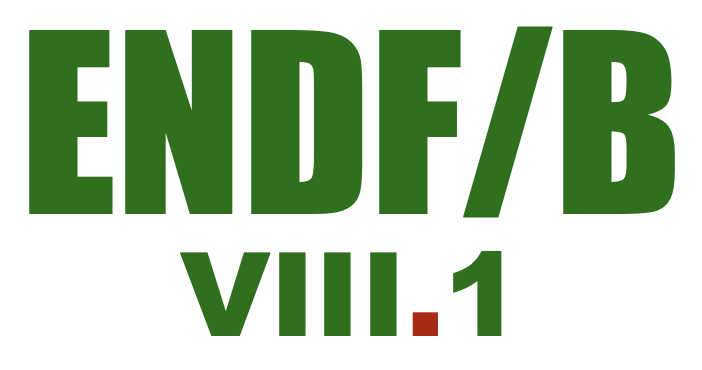
ENDF/B-VIII.1 Evaluated Nuclear Data Library
Library Summary
The ENDF/B-VIII.1 release is the newest evaluated nuclear data library produced, distributed, and recommended by CSEWG for use in nuclear science and technology applications. Among the many key advances, relative to the previous version ENDF/B-VIII.0, are: re-evaluation of 239Pu file by a joint international effort; updated 16,18O, 19F, 28-30Si, 50-54Cr, 55Mn, 54,56,57Fe, 63,65Cu, 139La, 233,235,238U, and 240,241Pu neutron nuclear data by the IAEA-coordinated INDEN collaboration; significant changes for 3He, 6Li, 9Be, 51V, 88Sr, 103Rh, 140,142Ce, Dy, 181Ta, Pt, 206-208Pb, and 234,236U neutron data; new nuclear data for the photo-nuclear, being 196 adopted from the IAEA2019 Photonuclear Data Library and one new file from JENDL-5; and new evaluations for the charged-particle and atomic sublibraries.
Numerous thermal neutron scattering kernels were re-evaluated or provided for the very first time. Additionally, new covariance testing was implemented. ENDF/B-VIII.1 reduced bias in the simulations of many integral experiments with particular progress noted for fluorine, copper and stainless steel containing benchmarks. Data issues which had hindered the deployment of ENDF/B-VIII.0 for commercial nuclear power applications in high burn-up situations, were addressed.
ENDF/B-VIII.1 data are distributed in both ENDF-6 and GNDS formats.
50 Years of ENDF
The U.S.'s Evaluated Nuclear Data File (ENDF) is the default low energy nuclear data library in particle transport codes such as MCNP, SCALE and even GEANT4. ENDF/B provides:
- Neutron reaction data needed for simulating nuclear systems
- Particle transport data and decay data used for health physics shielding calculations
- Activation and decay data needed for spent fuel modeling
- Charged-particle reaction data for fusion applications
The ENDF library has been under continuous improvement since 1968, the year the Cross Section Evaluation Working Group (CSEWG) released ENDF/B-I. CSEWG is a long-running collaboration between members of several DOE and other programs (Criticality Safety, Office of Science, Defense Programs, Naval Reactors, Nuclear Energy, NIST, & others), industry and international partners. 2018 marks the 50th anniversary of the ENDF library.